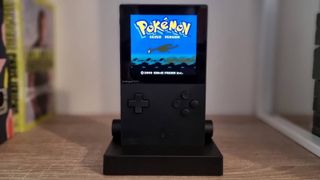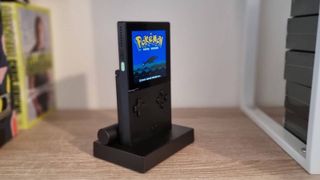Analogue Pocket isn't for everyone, and that's precisely what makes it so great
Opinion: an incredible retro gaming experience for a niche crowd

The Analogue Pocket is a delightfully indulgent device. From its pixel-perfect 3.5-inch display and beautiful, sleek design, it's unashamedly geared towards a small user base of devoted retro enthusiasts who want nothing more than to relive the halcyon days of handheld gaming. But in the best possible way.
Crucially, there's no emulation here, unlike many other retro gaming handhelds on the market. The Analogue Pocket plays Game Boy, Game Boy Color, and Game Boy Advance cartridges natively, and you can buy adapters for Neo Geo Pocket, Sega Game Gear, and Atari Lynx games too.
It means all those games you grew up playing decades ago will run exactly how you remember on the Analogue Pocket – but so, so much better. The Analogue Pocket's gorgeous screen and clever software include advanced features that inject new life into games – like a sharpening option, frame blending, as well as support for original display modes.
You can also suspend and resume your gameplay at a moment's notice using the Analogue Pocket's sleep function, which is a delightful addition and all the more impressive when you realize it's running older games natively. Jumping back into Pokémon Silver and playing from exactly where you left off is just fantastic.
The Analogue Pocket can also be docked to your TV, just like a Nintendo Switch (though the Dock is sold separately). The Pocket outputs games at 1080p when connected to a TV, and you can attach up to four Bluetooth controllers for some seriously old-school couch gaming.
But that's not all. You can even create music on the Analogue Pocket. Heck, it's open to developers to create new games, which means it could one day be home to some incredible titles from independent developers.
If that wasn't enough (and honestly, we're being utterly spoiled at this point), you can purchase Analogue's Link Cable and play local multiplayer games with multiple Pocket Analogues or with original hardware. That means you can trade Pokémon with someone using a chunky yellow Game Boy like it's 1998 again. Seriously cool.
Get daily insight, inspiration and deals in your inbox
Get the hottest deals available in your inbox plus news, reviews, opinion, analysis and more from the TechRadar team.
100% accurate gameplay and sound

These modern-day additions provide a retro gaming experience that's simply unparalleled. The mere fact that you can delve into your existing library of titles – if you've hung onto them after all these years – is a novelty in itself. You might even need to blow into the cartridge slot to get some of them going again. How's that for nostalgia?
But this isn't just a system that will please those with rose-tinted glasses. The Analogue Pocket not only transports you back to a simpler time but reinvigorates everything in the process. You don't have to suffer through playing on impossibly dim screens or scouring the cupboards for some new AA batteries; the Analogue Pocket makes it feel as though the Game Boy was released yesterday as opposed to 1989, and that's a remarkable achievement. It means that new players can discover and enjoy games from decades ago, many of which are still fantastic today, rudimentary graphics aside.
The question is, though: in a world of 4K TVs, HDR, and 120Hz capable displays, is there a fevered demand to revisit Game Boy, Game Boy Color, and Game Boy Advance games? Absolutely not. But if you have even the slightest interest in revisiting handheld games or have been dissuaded by the gray area of downloading ROMs and emulating in the past, the Analogue Pocket is a must-buy. It's a luxury product in the truest sense of the word ($219.99 for the console alone), and it's all the better for it. Welcome to your fast-track ticket to retro gaming heaven.
Adam was formerly TRG's Hardware Editor. A law graduate with an exceptional track record in content creation and online engagement, Adam has penned scintillating copy for various technology sites and also established his very own award-nominated video games website. He’s previously worked at Nintendo of Europe as a Content Marketing Editor and once played Halo 5: Guardians for over 51 hours for charity. He is now an editor at The Shortcut.
Most Popular


